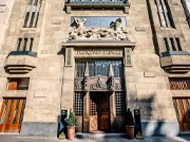Our head of Brand & Offline Marketing, Caroline La Niece, is gearing up for a busy summer supporting the food waste organisation Second Helpings. As schools close for the holidays, around one million children eligible for free meals will face weeks without this important lifeline. The Second Helpings project will be on hand to serve nutritious meals to families who need them in Stamford. And with the cost of living crisis surging, it will likely be the busiest summer yet. The non-profit also provides a shop and food bunker, which is open to everyone 24/7. No vouchers or appointments are required, and no one is ever turned away.
Caroline has been volunteering with the Second Helpings since the pandemic in 2020, from cooking in the kitchen, to managing their PR. At a time when many people were self-shielding, the project worked with charities to deliver thousands of dinners and food parcels to the doors of the most vulnerable. During this period of lockdown, the initiative saw 350 visitors per week, compared to 180 before the announcement.
Who are Second Helpings
Established in 2015, as part of the Real Junk Food Project, Second Helpings rescues surplus food and items nearing their best before date. Much of the food is donated by supermarkets, bakeries, fruit and veg stalls and allotment owners. This produce is then used to prepare healthy three course meals, serving over 80 people a day in the Saturday cafe. The surplus food is also organised and stored in the shop and food bunker, where people can help themselves, or pay what they feel. This means people can pay using their time or talents, whether that’s helping to clear up, cook or volunteer in any way they like. Anyone can access this food, whether you are in need or want to be a part of reducing food waste for environmental reasons.
Saturday Cafe
Since the end of the pandemic, the Saturday Cafe has been providing a much needed social occasion for those who became very isolated or nervous about getting together again. Visitors often stay from 12 till 2pm, chatting with their friends, or people they’ve met here, enjoying tasty meals and plenty of tea and coffee.
Asked where she gets her inspiration for recipes, Caroline said, “It’s very much like Ready, Steady, Cook. You work with the fresh items donated on the day.” The kitchen makes about 80 main and vegetarian meals that have to be cooked by midday, ready for serving. The kitchen does have a store cupboard filled with rice, pasta and spices, but the majority of the produce has been donated. The cafe is also open over Christmas, serving up all the trimmings and festive cheer for those who don’t have friends or family to visit.
Reducing waste
Second Helpings are passionate about reducing food waste, using food gifted from local sources that would otherwise go to landfill. Over 30% of the world’s food is wasted, that’s 1.3 billion tons per year, and 1,000 tons every minute. Over a third of this comes from supermarkets, shops and households, much of which is thrown away when it’s perfectly fit for eating. Food waste is not only hard to stomach against needless global hunger, but it has a detrimental impact on the environment, releasing 3.3 billion tons of CO2 into the atmosphere every year. Up to 30% of greenhouse gases are attributed to the global food system, along with 250 square kilometres of freshwater that is consumed on producing the food which goes to waste.
Second Helpings have intercepted 43,000 kilos of this surplus food, feeding 12,500 people. These efforts are bridging the gap between food wastage, and serving communities in need. If you want to find local food waste cafes and markets in your area, check out The Real Junk Food Project website.

About the author
A thrill-seeking globetrotter, Lydia is passionate about trying out new experiences around the world. From rushing down the slopes of Savoie to quad biking over the dunes in Cape Verde, she wants to help holidaymakers get the most out of their next adventure.
















